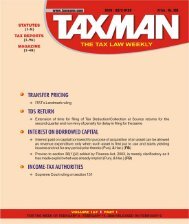CPT V24P7-Art1 (Content).pmd - Taxmann
CPT V24P7-Art1 (Content).pmd - Taxmann
CPT V24P7-Art1 (Content).pmd - Taxmann
You also want an ePaper? Increase the reach of your titles
YUMPU automatically turns print PDFs into web optimized ePapers that Google loves.
COMPANY LAW<br />
INTRODUCTION<br />
696<br />
Related Party Disclosures<br />
and legal provisions<br />
1. In corporate world, the main difficulty is<br />
separation of real owners and management.<br />
There is possibility that management by using<br />
their powers may cheat the investors. So, the<br />
compliances to various provisions regarding<br />
related party transactions and disclosing the<br />
same in financial statements form an integral<br />
part from view point of an investor. Related<br />
party relationships are normal features of<br />
commerce and business houses. Without related<br />
party disclosures there is general assumption<br />
that transactions reflected in financial statements<br />
are consummated on an arm’s length basis<br />
between independent parties. Thus, a related<br />
party relationship could have an effect on the<br />
financial position and operating result of an<br />
enterprise.<br />
In India, there is complexity of provisions relating<br />
to “Related Party Transactions”. Various<br />
establishments may be complying with the<br />
same under different Acts simultaneously, like<br />
the Companies Act, 1956, the SEBI Act and<br />
their rules and regulations, Accounting Standard<br />
18 (AS 18), etc. As per different provisions,<br />
it is responsibility of corporate houses to keep<br />
the stakeholder’s aware of all major corporate<br />
developments to help them to take informed<br />
decisions.<br />
KIRAN MUKADAM<br />
CS<br />
DIFFERENT PROVISIONS OF RELATED<br />
PARTY DISCLOSURES<br />
2. Following are the different provisions<br />
regarding related party disclosures:—<br />
2.1 Companies Act, 1956 -<br />
August 1 to 15, 2012 u TAXMANN’S CORPORATE PROFESSIONALS TODAY u Vol. 24 u 76<br />
2.1.1 Section 297: Approval of contract by the<br />
Board of Directors - A Director who is interested,<br />
whether directly or indirectly in a contract or<br />
in an arrangement or proposed contract or<br />
arrangement entered into or to be entered by<br />
or on behalf of the company, shall disclose the<br />
nature of his concern or interest at a Board<br />
meeting. The Central Government’s previous<br />
approval is required, if the company’s paidup<br />
capital is more than ` 1 crore. At the same<br />
time section 297(2) provides certain exemptions<br />
like transactions based on cash and prevailing<br />
market price, ordinary business transaction in<br />
banking and insurance business, Contract value<br />
less than ` 5000 in case of regular trading of<br />
goods, materials or services, etc. The company<br />
shall enter such contracts or arrangements in<br />
register maintained under section 301 within<br />
prescribed time-limit.<br />
2.1.2 Section 295: Loans to Directors - The public<br />
company cannot extend directly or indirectly<br />
loan or give any guarantee or provide any<br />
security in connection with loan to any director











![“FORM NO. 3CEB [See rule 10E] Report from an ... - Taxmann](https://img.yumpu.com/45480232/1/190x245/form-no-3ceb-see-rule-10e-report-from-an-taxmann.jpg?quality=85)





